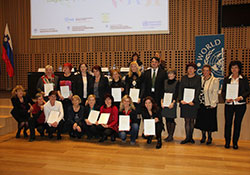20 years of school-based health promotion in Slovenia

Slovenian National Institute of Public Health
To commemorate the 20th anniversary of Slovenia´s Healthy Schools Network, the National Institute of Public health together with WHO and the ministries of health; labour, family, social affairs and equal opportunities; education, science, culture and sport organized a national conference on health promotion in the school environment, entitled "Together for the better health of children and adolescents – the maintenance and provision of equal opportunities."
The event was attended by over 250 participants, namely representatives of the 3 key sectors, experts in various fields and teaching staff.
The Slovenian Network, which is coordinated by the National Institute of Public Health, has already enrolled 324 (half of all) primary and secondary schools. The purpose is to promote, facilitate and strengthen the physical, mental, social and environmental health of pupils, teachers and parents.
Common responsibility and approach
The health and quality of life of children and adolescents concern not just themselves, their immediate environments (family, school) and the health sector, but the entire society. All sectors generate the conditions, structure and environments that can support and enhance young people´s health.
The national consultation on health promotion in the school environment therefore actively involves 3 key sectors (health, education and welfare), which together seek a common approach to protecting the health of children and adolescents, and creating and promoting equal opportunities and healthy environments.
Expert input and conclusions
Keynote speakers Dr Ivan Eržen, Acting Director of the National Institute of Public Health, and Vivian Barnekow, Programme Manager, Child and adolescent health, WHO/Europe, highlighted the importance of social determinants of health and intersectoral cooperation.
Director generals Ms Mojca Gobec, Ministry of Health; Ms Vlasta Poličnik, Ministry of Education, Science and Sport; and Ms Ružica Boškič, Ministry of Labour, Family, Social Affairs and Equal Opportunities, led a roundtable discussion, during which participants agreed on the following conclusions:
- The 3 key sectors in Slovenia already cooperate in the field of health and well-being of children and adolescents, but even closer cooperation (possibly also including other sectors) can contribute significantly to greater efficiency.
- A first step would be creation of a cross-sectoral group on enhancing the health and well-being of children and adolescents.
- The Healthy Schools Network has contributed significantly to past successes and may continue to facilitate joint efforts in working with children and adolescents.



